Jamaican Coconut Rock Cakes or Buns are an adaption from traditional British rock cakes, with the main difference being the addition of coconut. This post is a follow on from our main British rock cake recipe. As we are a plant-based family we use vegan margarine and plant-based milk to bake our egg-free rock cakes but of course you can use your usual ingredients. Also if you would like to prepare gluten-free Jamaican rock cakes then we have an easy method for adapting the recipe which you can find within our FAQ section below.
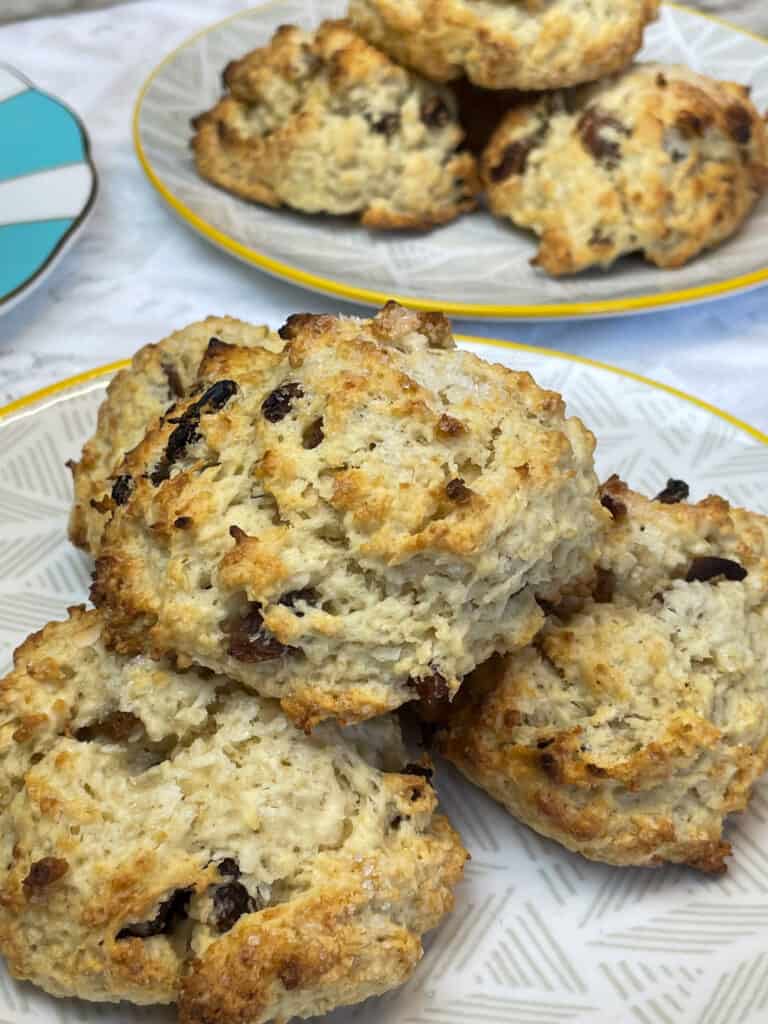
Rock cakes are a very forgiving bake and so can be baked by mostly anyone regardless of their baking skills! You don’t have to be precious in shaping the cakes as the more lumpy and bumpy they look the better! Although you can go one step further and make the rock cakes look prettier by topping each with a little candied cherry before baking!
Jump to:
Origins Of Jamaican Rock Cakes
Jamaican Rock Cakes or Rock Buns, have an interesting origin that dates back to the British colonial influence in Jamaica. Rock Cakes are a traditional British bake, dating back to at least the Victorian era. They were a useful bake as they contained everyday pantry ingredients, were easy to prep, and lasted a good while. These factors made them especially popular during times of rationing, such as during World War II.
When the British colonised Jamaica and other parts of the Caribbean, they brought with them their traditional recipes. Over time, British recipes like Rock Cakes were adapted in Jamaica, by adding local flavours and ingredients. This resulted in the Jamaican Rock Cake, a variation that often includes spices like nutmeg and cinnamon, desiccated coconut, and sometimes dried fruits.
These small, hard, and crumbly cakes are named for their rough, rocky appearance rather than their texture, which somewhat resemble scones but with a harder exterior and a delicious softer inside crumb.
How To Prepare
The ingredients required for a batch of home-made Jamaican rock cakes are - plain flour [all-purpose flour], baking powder, margarine [or your usual baking fat, we like to use Stork baking spread or block], sultanas, [or your preferred dried fruits], desiccated coconut, vanilla extract, milk [we like to use oat or soya milk but your usual milk will do fine], and granulated sugar.
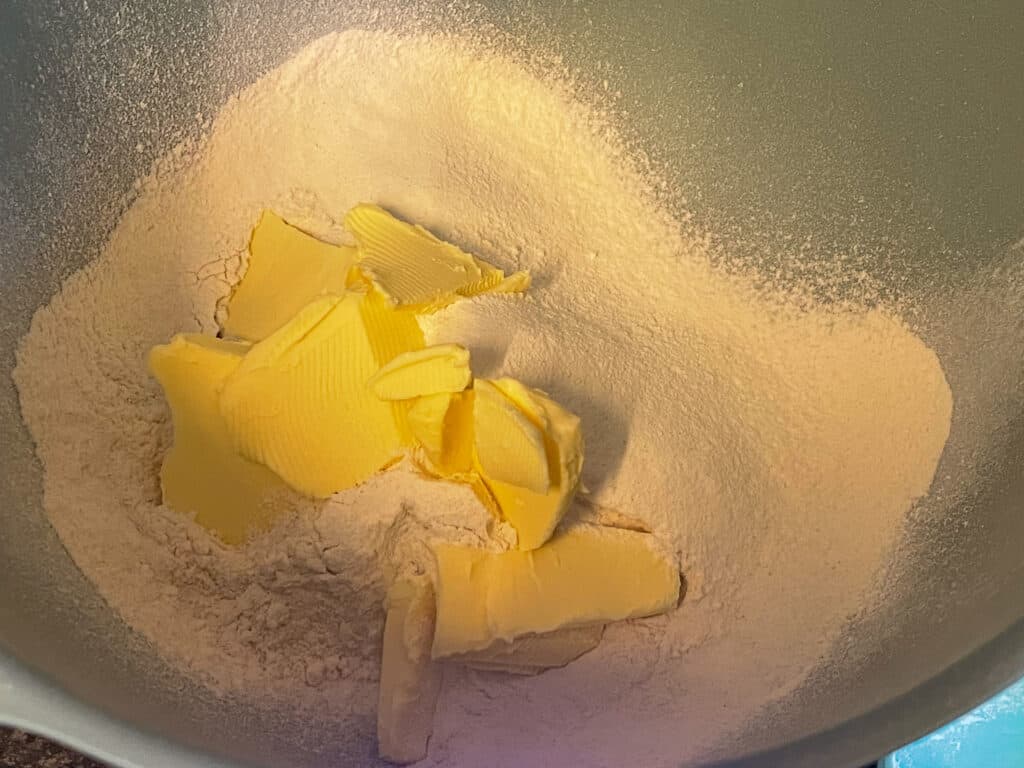
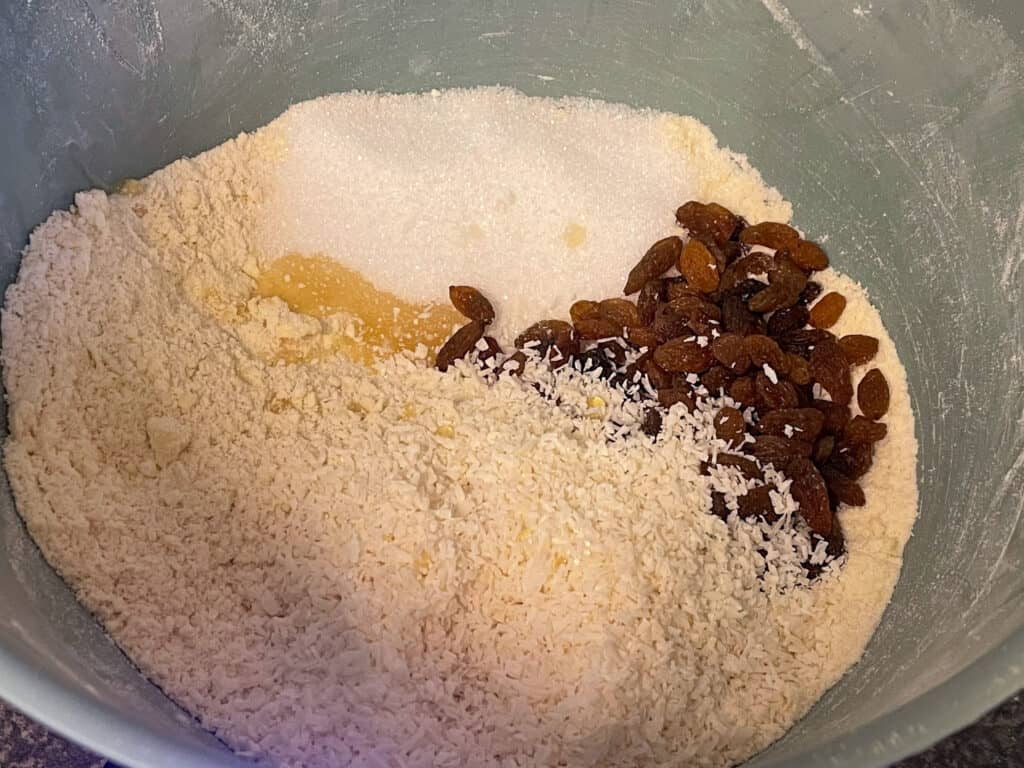
Step 1: Sift the flour and baking powder into a mixing bowl and stir.
Step 2: Add the margarine in little lumps to the bowl. Using your fingertips rub the margarine into the flour mixture until it resembles breadcrumbs.
Step 3: Add in the sultanas, desiccated coconut, sugar and vanilla extract.
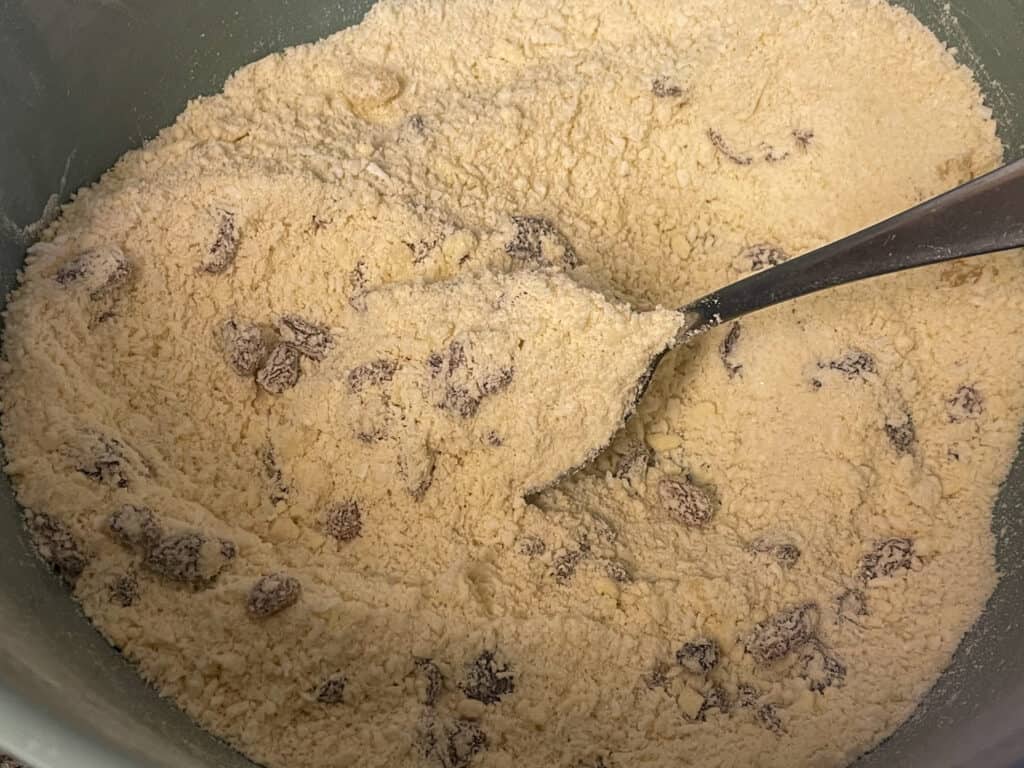
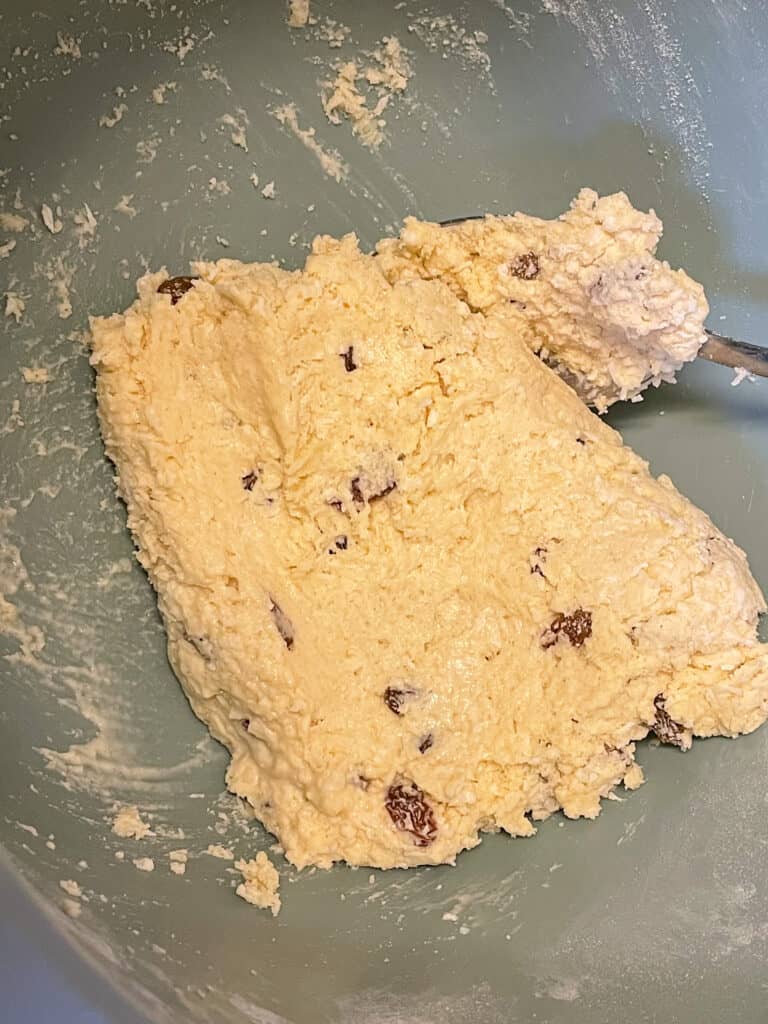
Step 4: Mix everything together.
Step 5: Add the milk a tablespoon at a time until the mixture is brought together into a thick, stiff dough.
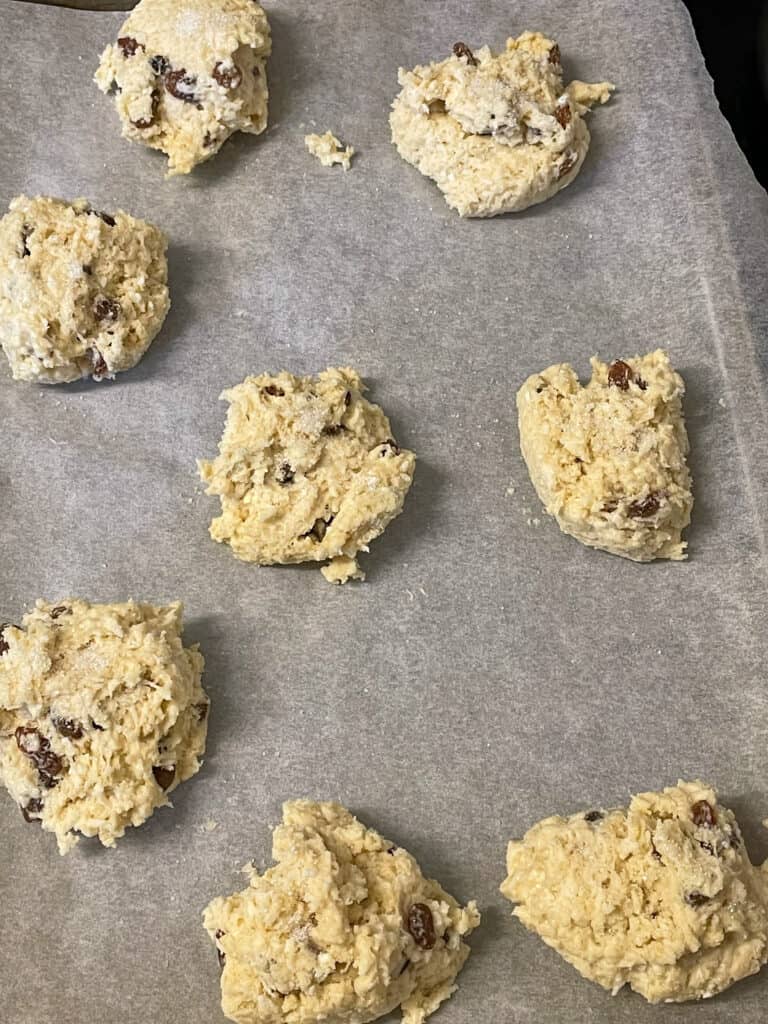
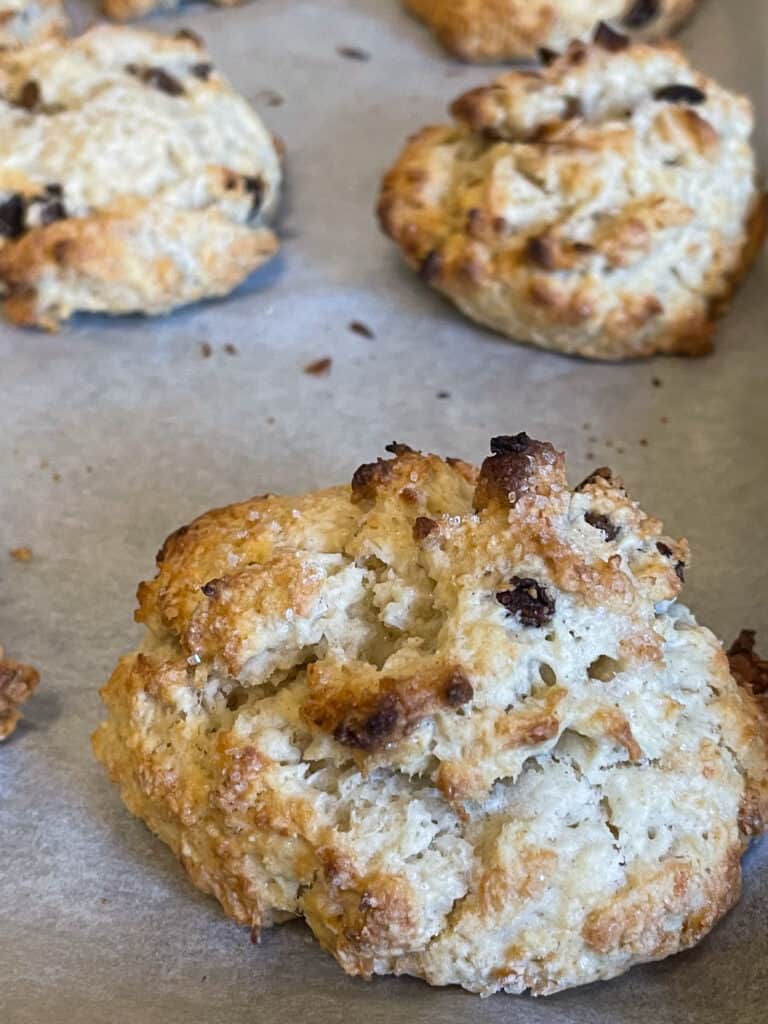
Step 6: Divide the mixture into 8 rocky looking buns.
Step 7: Sprinkle extra sugar over the top of each cake.
Step 8: Bake for 10-15 minutes.
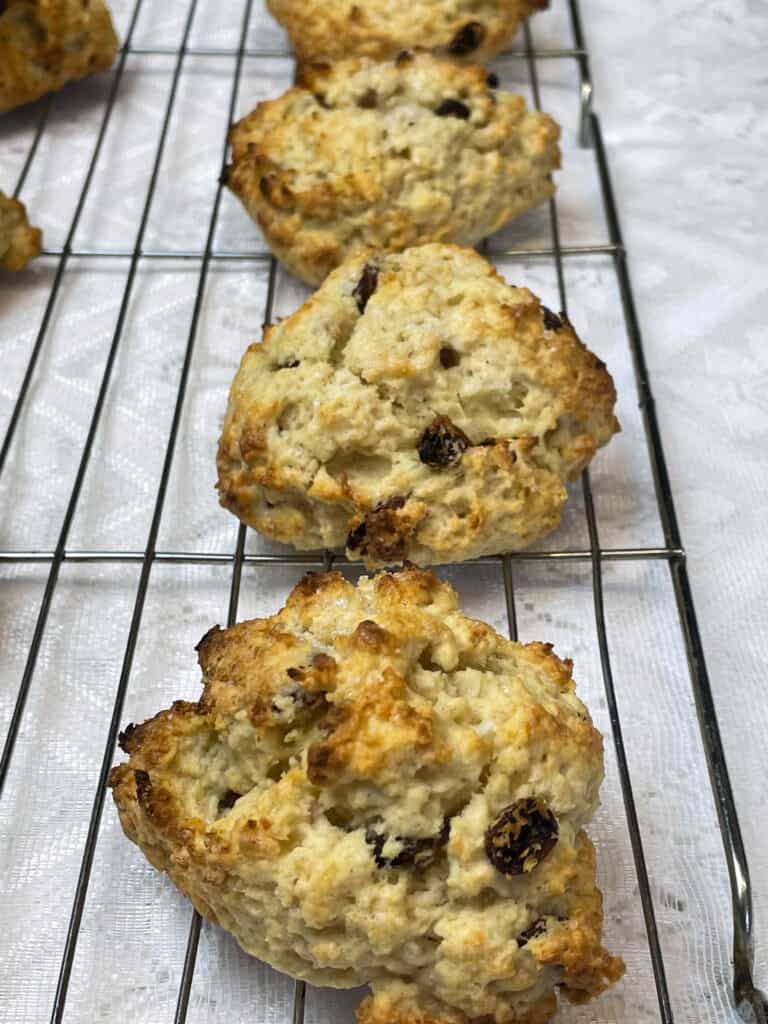
Step 9: Allow to cool for a few minutes on the baking tray before removing and cooling on a cooling rack. Alternatively, leave the cakes to cool on the baking tray. Rock cakes can be enjoyed warm from the oven or at room temperature.
Recipe notes
Storage
Rock cakes can keep for up to 4 days - keep in a a covered container wrapped in kitchen foil or baking paper. If necessary you can refresh older rock cakes by warming them up in a warm oven for a few minutes.
Freezing
Rock cakes can be wrapped in food safe wrap and placed into a freezer proof container and frozen for 2-3 months. Alternatively, flash freeze the cakes on a baking tray before wrapping and placing into the freezer.
FAQ
Yes, you can prepare these rock cakes as gluten-free with a few changes. First use a gluten-free plain flour blend and sift through a ¼ [ a quarter] teaspoon of xanthum gum. Next, ensure that your baking powder is labelled as gluten-free. Finally, as gluten-free bakes often require a little extra liquid you may end up using 1-2 tablespoons extra milk to create the rock cake dough.
Any margarine, butter, baking spread or block that is fine for baking and cooking can be used for baking rock cakes. We like to use Stork margarine baking spread or block as it is free from animal ingredients and we find that it provides constantly good baking results.
Sultanas are a type of dried raisin so you can use any type of raisin you have to hand, or use dried currants, or mixed dried fruits. You can also use dried mango, papaya, melon, apricots, dates, figs, apple, pear, etc but do ensure that the larger dried fruits are chopped up into the size of a raisin before adding to the rock cakes.
More traditional family favourite baking recipes
All our traditional bakes have been prepared without eggs or dairy as we are a plant-based family and love vegan animal-free bakes. We also use plant-based or vegan margarine or butter but of course you can substitute the milk or margarine/butter for ones you normally use for baking.
It can be surprising for some but deliciously fluffy, well-risen, and soft crumbed traditional bakes can be prepared minus the eggs! We like to use ordinary ingredients for our bakes as we want them to be accessible to as many people as possible. Here are a few more of our family favourite baking recipes that we are excited to share with you - our old school dinners favourites this Jam and Coconut sponge and this Chocolate Sponge Traybake.
And for an amazing bake that dates back to the Victorian era you can’t go wrong with a slice of this delicious Old-Fashioned Ground Rice Cake paired up with a nice cup of tea. And of course if you love our Jamaican rock cakes you will love the original British Rock Cakes recipe.
***please note: for US measurements click the 'US customary button' within the recipe and the measurements will switch to tablespoons, cups, and ounces.***
📖 Recipe
Jamaican Coconut Rock Cakes
Equipment
- Baking tray Lined with parchment or baking paper
- Mixing bowl
- sieve
Ingredients
- 180 grams Plain flour [all-purpose flour]
- 2 teaspoons Baking powder
- 60 grams Margarine [suitable for baking] [we use Stork baking spread or block]
- 45 grams Granulated sugar [or caster, Demerara, soft or light brown sugar, plus extra for sprinkling]
- 40 grams Desiccated coconut
- 1 teaspoon Vanilla extract optional
- 60 grams Sultanas [golden raisins] [or raisins, dried currants, or mixed dried fruits]
- 8 tablespoons Milk [more or less as required, we use soya or oat milk but you can use your usual milk]
Instructions
Preheat the oven to 180 Fan/ 200 Celsius/ 392 Fahrenheit/ Gas 6.
- Prepare the baking tray with a layer of parchment paper if necessary.
- Sift the flour and baking powder into a mixing bowl.180 grams Plain flour, 2 teaspoons Baking powder
- Rub the margarine into the flour mixture using your fingertips until the mix resembles breadcrumbs.60 grams Margarine [suitable for baking]
- Stir through the vanilla extract, coconut, sugar and sultanas.45 grams Granulated sugar, 40 grams Desiccated coconut, 1 teaspoon Vanilla extract, 60 grams Sultanas [golden raisins]
- Add the milk a tablespoon at a time and mix, until a very thick, stiff, sticky dough is formed.8 tablespoons Milk
- Divide the dough into 8 rocky blobs. A rustic looking appearance is perfect.
- Sprinkle extra sugar and a little extra coconut over the top of each bun.
- Bake on the middle shelf for 10-15 minutes until risen, firm, tinged with golden hues and baked. Our fan oven takes 10 minutes to bake these rock cakes but other types of oven will likely require a few minutes extra as fan ovens bake faster.
- Leave the cakes to rest on the baking tray for a few minutes before removing to cool on a cooling rack, or they can just be left to cool on the baking tray.
- Rock cakes can be enjoyed warm from the oven or at room temperature.
Notes
- Nutritional information is provided for guidance only and is not a strict calculation as ingredients vary.
- Store Jamaican rock cakes within a covered container such as a cake tin, biscuit tin or plastic tub, an additional wrapping of kitchen foil or parchment paper helps preserve the rock cakes for longer.
- Rock cakes will keep for up to 4 days.
- Older rock cakes can be refreshed by heating in a warm oven for a few minutes.
- Rock cakes can be frozen for up to 2-3 months, well wrapped.
- Sultanas can be replaced with mixed dried fruits, raisins, dried currants, chopped dates, chopped dried apricots, dried pineapple or papaya, etc. Or use dried mixed fruits.
- For details on adapting this recipe for gluten-free Jamaican rock cakes have a look at our FAQ section above this recipe.
- We have a British rock cake recipe as well so do have a go at those also!
Nutrition
Comments
Prepared our Jamaican Coconut Rock Cakes recipe? We would love to know how you go on with the recipe so do drop us a comment below and click the star ratings.
All your feedback is very much appreciated and it helps us to develop new family favourite recipes that we are sure you will love.
If you have a particular traditional favourite that you would like to see adapted as animal-ingredient free then do drop us a comment or contact us. Thanks so much, Love Jacq x
RiaSunflower says
I was pleasantly surprised by how good these coconut rock cakes were. They were in fact delicious. I used currants steeped in rum in place of sultanas.
Thank you.
Jacq says
Thanks very much for your comment! I’m very happy that you enjoyed the rock cakes. Steeping the fruits in rum sounds perfect for the Holidays x